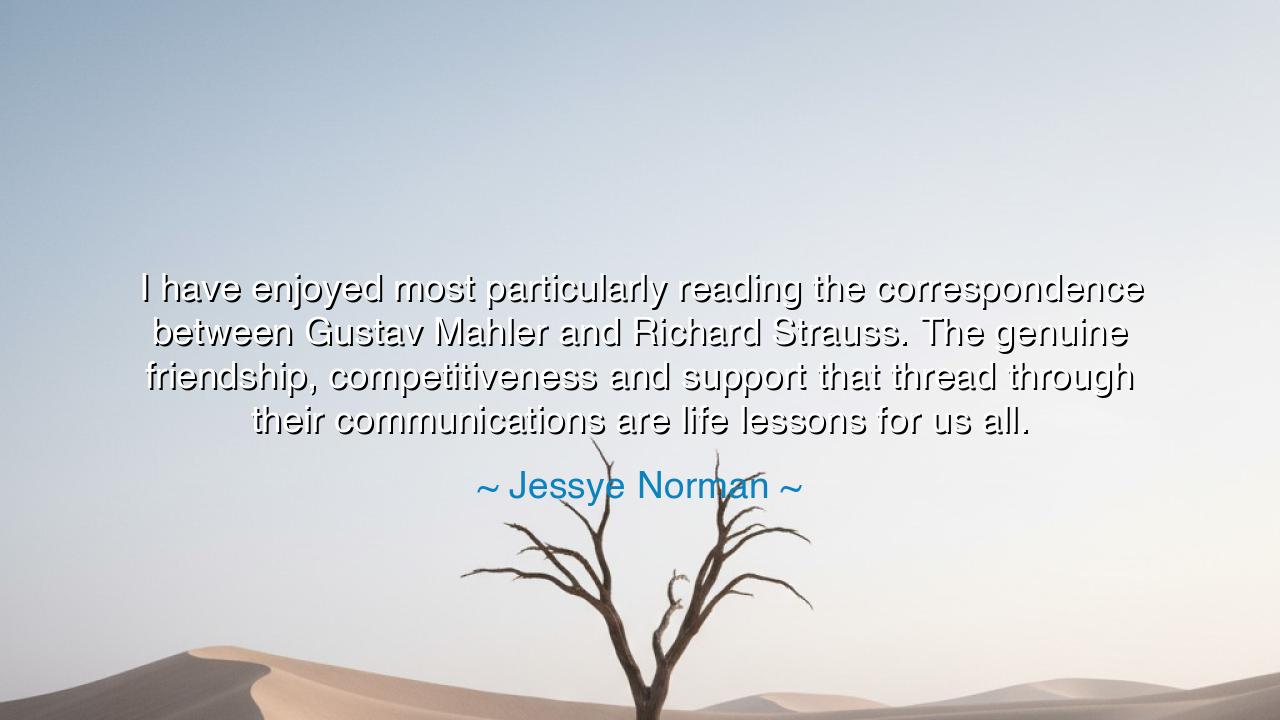
I have enjoyed most particularly reading the correspondence
I have enjoyed most particularly reading the correspondence between Gustav Mahler and Richard Strauss. The genuine friendship, competitiveness and support that thread through their communications are life lessons for us all.






In the heart of the human experience, there are bonds formed through art, music, and the shared pursuit of greatness. Jessye Norman, the revered artist and voice of generations, speaks of one such profound bond in her reflection: "I have enjoyed most particularly reading the correspondence between Gustav Mahler and Richard Strauss. The genuine friendship, competitiveness, and support that thread through their communications are life lessons for us all." Here, we hear the echo of something deeper than mere interaction between two artists; we hear the essence of what it means to be human—to connect with another in a way that is complex, filled with growth, challenge, and a shared desire to transcend the limits of the self.
The ancients understood that friendship was not always a path of ease. Often, the most profound bonds were tested not by harmony, but by the tension of competition, the pull of ambition, and the struggle for individual identity within a collective journey. The bond between Mahler and Strauss, two of the greatest composers in the history of music, was one of such depth. It was a relationship formed not out of idle conversation, but through the sharing of ideas, the challenge of each other’s talents, and a mutual respect that pushed them both to reach greater heights. This was not a friendship of ease; it was one built on a mutual striving to become better, to be greater than they were alone.
Mahler and Strauss were not simply colleagues; they were two spirits who understood the meaning of art as both a personal pursuit and a shared experience. Their letters, filled with support, rivalry, and advice, became the record of two souls navigating the delicate balance between personal ambition and shared vision. This is what Jessye Norman sees in their correspondence: the reminder that life’s greatest lessons often come from those relationships that are complicated yet ultimately nurturing. These two men, both giants in their own right, never allowed their rivalry to tear them apart; instead, they used it as fuel to challenge and support each other, ultimately creating a legacy that continues to inspire.
Think of the ancient warriors, whose bonds were often forged not in peace, but in the heat of battle. Achilles and Patroclus were not simply friends, they were companions whose destinies were intertwined in such a way that even death could not sever their relationship. Their friendship was born out of competition, yes, but it was also strengthened through mutual respect and a shared understanding of the struggles they faced. It was the tension between individual greatness and collective loyalty that made their bond so powerful, just as the correspondence between Mahler and Strauss reflects this dual nature of competition and support.
The true lesson in Mahler’s and Strauss’s exchanges is the understanding that friendship, in its highest form, does not always mean perfect harmony. True friendship, as their letters reveal, is messy, dynamic, and sometimes even uncomfortable. It is not about always agreeing, but about having the strength to challenge each other, to compete, and to offer support when it is needed most. Through competition, both men were able to grow and evolve, but through support, they found the strength to keep moving forward in a world filled with constant challenges. This balance, this delicate dance of rivalry and collaboration, is what makes friendship in the arts—whether in music, literature, or philosophy—so deeply profound.
In our own lives, we must embrace the lessons of these great men and women who have shown us that growth comes not from isolating ourselves in pursuit of individual glory, but from building relationships that challenge, nurture, and support. The lessons of Mahler and Strauss remind us that we are not meant to walk this path alone. Whether in art, business, or personal growth, our greatest achievements come not from fighting alone, but from finding those who will both push us and catch us when we fall. Friendship in its truest form is about balance—about the give and take that comes from challenging one another and offering a steady hand when needed.
Let us take from this the courage to build such friendships in our own lives—relationships that are not simply built on comfort and conformity, but on the challenge of growth and the support of loyalty. Let us not shy away from the tension that can arise in competitive friendships, for it is this tension that will strengthen us, just as the music of Mahler and Strauss was made greater by their shared rivalry and mutual respect. The lesson they teach us is one of unity through challenge, of support through competition, and of the power of true friendship to propel us toward our highest potential.






AAdministratorAdministrator
Welcome, honored guests. Please leave a comment, we will respond soon